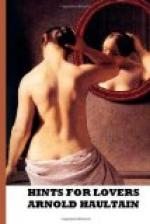Every lover attempts that impossible task: the realization of the heavenly ideal. Perhaps
It is in aphelion that the corona appears most splendid;
Were perihelion to result is coalescence, perhaps the photosphere would be proved composed of terrestrial vapors. And if it did (as no doubt it would), would it be at all bedimmed? For, to the devout astrologer
Nothing, nothing will ever destroy beauty—and therefore wonder. So,
Bodily beauty, where Love is priestess, is a daedal spur to the loftiest worship.
The lover is ever worshipful. And
Where is worship, nothing can be profane. So
In love there is nor taint nor stain. Therefore,
Make, O youthful lover, the best and most of youth and love: never will either recur.
* * *
VI. On Making Love
“Mille modi Veneris”
—Ovid
There are as many ways of making love as there are of making soup. And probably
There are as many kinds of love as there are of flavors. And
Palates—both sentimental and physical—evidently differ widely. And yet,
If you would know the secret of success with women, it is said in a word: Ardor. And
Would ye, O women, know in a word the secret of success with men? It lies in: Responsiveness.
* * *
In matters amatory—or rather pre-amatory—feminine tactics are infallible and consummate:
Let no man think to cope with feminine strategy.
* * *
A rake has more chance than a ninny.—Which doubtless has been said before.
* * *
In love, as in all things, indecision spells ruination. For
There is a curious antagonism between the sexes. They are in a manner foes, not friends. The successful wooer is the captor, the raptor; the bride is the capture, the rapture. (1) And
Even she who is minded to be caught will not spare her huntsman the ardor of the chase, and lightly esteems him who imagines she is to be lightly won.
In the chess-like game of love-making, no woman plays for check-mate: the game interests her too much to bring it to a finish. What pleases her most is stale-mate, where, though the King cannot be captured, the captress can maneuver without end.
A man imagines he wins by strenuous assault. The woman knows the victory was due to surrender.
(1) Etymologically as well as metaphorically—and veritably.
* * *
Wouldst thou ask ought of a woman? Question her eyes: they are vastly more voluble than her tongue. Indeed,
There is no question too subtle, too delicate, too recondite, or too rash, for human eyes to ask or answer. And
He who has not learned the language of the eyes, has yet to learn the alphabet of love. Besides,




